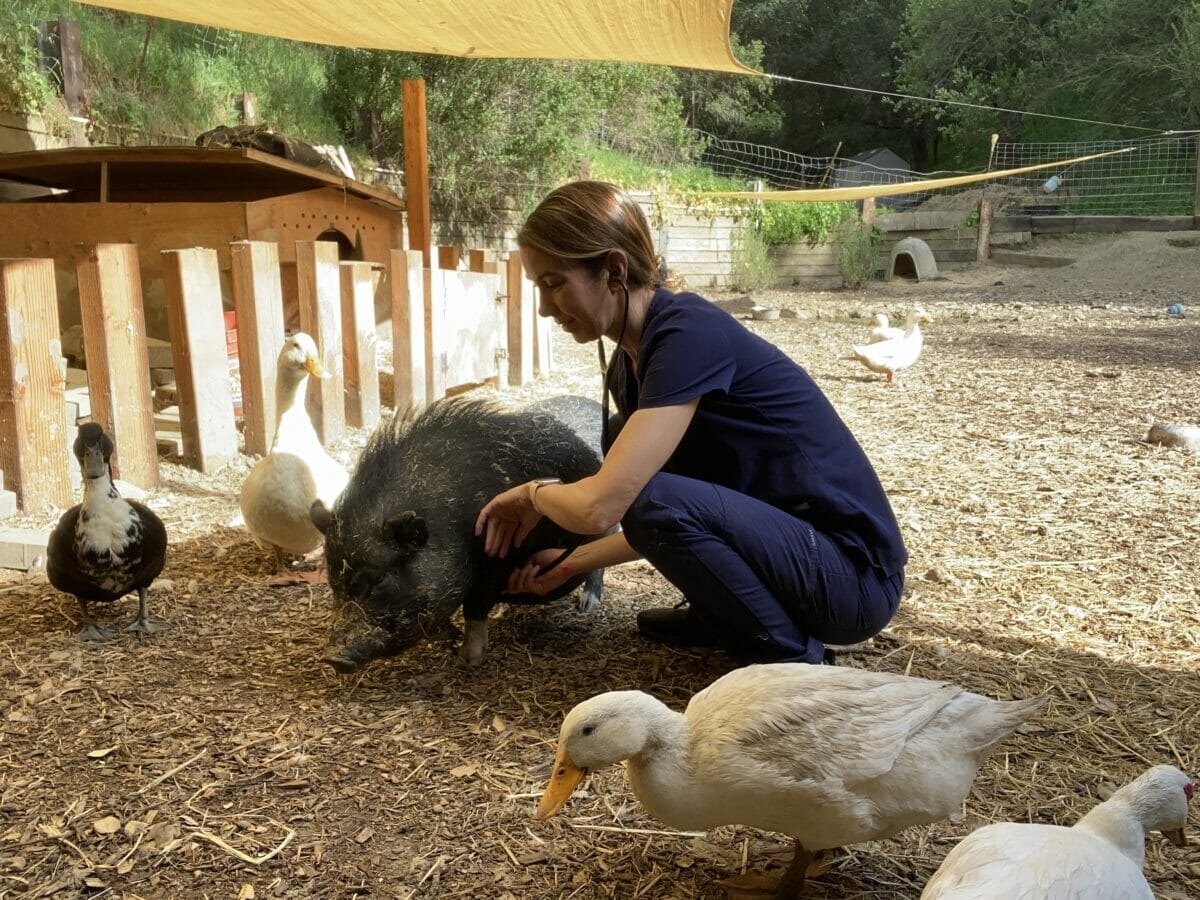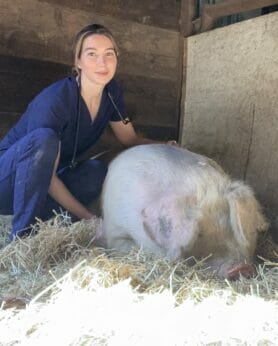I am one of more than 500 veterinary professionals who oppose the proposed EATS Act. Supporting this legislation would violate our oath to prevent animal suffering.

For too long, the pork industry has been permitted to inflict what amounts to criminal animal cruelty—with the help of billions of dollars in public funding. Approximately two-thirds of mother pigs, weighing 525 to 790 lbs, are trapped within gestation crates for the entirety of their 114-day pregnancy. These stalls, measuring 2.5 feet by 7 feet, cruelly restrict their mobility, permitting only a few steps forward and backward—an experience similar to enduring months of confinement to an airline seat without any cushions. To ward off obesity, producers intentionally subject them to a perpetual state of hunger.
In 2018, voters in California decided they’d had enough and passed Proposition 12. That legislation stipulated that pork entering California’s markets must originate from animals whose mothers were given a minimum of 24 square feet of space, freeing hogs from gestation crates.
The law was meant to go into effect last year, but it was blocked by legal challenges from the National Pork Producers Council, which were eventually struck down by the Supreme Court this spring. Prop 12 will take effect December 31, 2023, and when it does, veterinarians like myself will be able to celebrate one small victory against this powerful industry.
[RELATED: Supreme Court’s Ruling on Humane Treatment of Pigs Could Catalyze a Wave of New Animal Welfare Laws]
However, a new challenge to Prop 12 has emerged: The Ending Agricultural Trade Suppression (EATS) Act poses yet another barrier to our efforts to alleviate extensive animal suffering. This proposed legislation aims to invalidate more than 1,000 state-level laws and guidelines pertaining to both food safety and the protection of animals. Among the signatories of a letter supporting the EATS Act, penned for the U.S. Congressional leaders, is Nebraska Governor Dr. Jim Pillen, a hog producer and veterinarian, who is also part owner of a slaughterhouse. His signature highlights the way politicians can wield their power to protect their own interests over the interests of the general public.
Veterinarians dedicated to the protection of farmed animals encounter multiple challenges as we strive to obey our oath to work for the “protection of animal health and welfare, the prevention and relief of animal suffering.” The reality of gestation crates is distressing: During one hour of observation, 92.6% of confined pigs exhibited signs of stress. These behaviors, marked by repetitive movements, serve as a mechanism to cope with being trapped in cages. One particularly pervasive stereotype is sham chewing, or repetitive chewing despite no food present in the mouth, which accounts for an astonishing 50-75 percent of the waking hours for these confined mother pigs.
This lack of mobility gives rise to a multitude of physical ailments as well—constipation, rectal prolapse, muscle wasting and painful pressure sores. The plight of these animals is exacerbated by the conditions they’re forced to endure: sitting in their own excrement, leading to urinary tract infections.

The author examines a pig. (Photo courtesy of Crystal Heath)
The ramifications of gestation crates extend beyond animal welfare, threatening our own health. Confined sows have markedly elevated levels of stress hormones—adrenaline and noradrenaline—compared to their group-housed counterparts. This heightened stress not only renders these animals more vulnerable to infections but also exacerbates the virulence of pathogens such as salmonella, campylobacter and staphylococcus aureus. Tragically, this susceptibility affects their piglets, resulting in suppressed immune function compared to piglets born to group-housed mothers. Piglets often remain infected until they reach slaughter. These infections often go undetected, and when infected pigs are slaughtered and sold, this creates a public health threat. The piglets of group-housed sows have better resistance and resilience and are exposed to fewer pathogens than those of crated sows.
Pork stands as the chief perpetrator of food-borne illnesses, with a staggering 787,000 annual cases in the United States alone. The economic toll is substantial, with salmonella infections linked to pork consumption resulting in a $1.9-billion annual cost to Americans. The prevalence of salmonella is pronounced among mother pigs, with 60 percent testing positive and 10 percent demonstrating resistance to multiple drugs. The consequences are manifold—it’s not just the health and welfare of the confined animals that is compromised; our own health is also put at risk.
In a bid to combat the escalating incidence of disease, producers resort to antibiotics, worsening the crisis of multi-drug-resistant bacteria. Data from 2022, released by the U.S. Food and Drug Administration, indicated that a staggering 89 percent of studied pork production facilities administered antibiotics and other antimicrobial drugs through feed with 27.1 percent of all antibiotics sold in the U.S. going to pork production. According to the World Health Organization, roughly 700,000 deaths annually can be connected to diseases that have become hard to combat due to antibiotic resistance. If this pattern continues, the number could surge to 10,000,000 by 2050.
Agriculture innovations and intensification have perpetuated the suffering of billions of farmed animals while simultaneously jeopardizing the health of our own species. As we look to the future, what will our relationship with other animals look like three decades from now? What health afflictions will plague us? The answers to these questions are contingent upon the policies we choose to enact today. The choices we make have ramifications for future generations, influencing not just the fate of farmed animals but our own species, too.
Dr. Crystal Heath is a veterinarian from Berkeley, CA, a graduate of UC Davis School of Veterinary Medicine and co-founder of Our Honor, an organization that supports veterinarians and animal professionals in advocating for the best interests of others, no matter their species. She is also on the founding committee of Veterinarians Against Ventilation Shutdown. She is also one of the nearly 400 veterinarians who signed onto the veterinarians’ and animal welfare scientist’s amicus brief to the US Supreme Court (NPPC vs. Ross).
Excellent post, agree with everything said! It’s important to note that many small farmers oppose the EATS Act because it would give large conglomerate agribusinesses the upper hand in the market.
Thank you for publishing this compelling, fact-based opinion. It’s heartening to see a veterinarian expressing such genuine concern for farmed animals. Opposing this very detrimental bill is so important for the various reasons stated. Here is an easy way to do so today: https://secure.aspca.org/action/usa-eats-act
Excellent completely agreed.
Is there anything we can do to help these poorer animals besides writing to congress, or is that the best way to help?
Very insightful and useful post. Thank you!